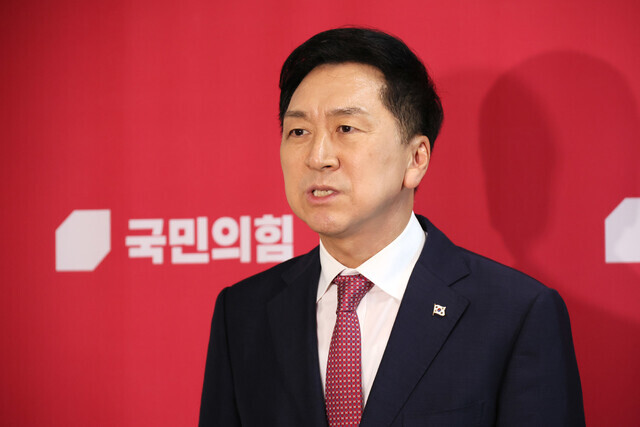hankyoreh
Links to other country sites 다른 나라 사이트 링크
Leader of Korea’s ruling party claims N. Korea is behind rallies about Itaewon tragedy, Fukushima water

Kim Gi-hyeon, the head of South Korea’s ruling People Power Party, said Wednesday that “North Korea’s orders are being carried out verbatim” in regard to candlelight rallies held after last year’s deadly crowd crush in Itaewon and demonstrations against Japan’s release of contaminated water from the Fukushima Daiichi nuclear power plant. His remarks attribute ideological motivations to routine civic actions motivated by concern for public safety and criticism of government negligence.
During a policy seminar at the National Assembly on Wednesday about North Korean espionage and the transfer of investigative authority, Kim opined that anti-state demonstrations are being organized by North Korean spies.
“When I hear people protesting the deployment of more THAAD [anti-missile] batteries and calling for American troops to withdraw, the ROK-US alliance to be abolished and our joint military exercises to be halted, I can’t help thinking that the orders came from North Korea,” Kim said.
Referring to demonstrations opposing the release of contaminated water from Fukushima, Kim said he “can’t help worrying that [spies and others] who are deeply embedded in Korean society may be openly carrying out anti-state actions on orders from North Korea.”
South Korea’s National Intelligence Service reported to the National Assembly’s Intelligence Committee on Monday that North Korea had ordered anti-state forces in South Korea to agitate against the release of contaminated water from Fukushima.
A similar viewpoint was expressed by Park Dae-chul, the ruling party’s policy chief, who organized the policy seminar.
“When North Korea sent an emergency order to hold a protest against [the contaminated water at] Fukushima and specified the location as the Japanese Embassy and Gwanghwamun Plaza, that’s where the protest was held. And when it ordered that a signature-collecting campaign, candlelight rallies, and a memorial for the victims be held after the Halloween tragedy [in Itaewon] and even specified the slogans of ‘What kind of country is this?’ and ‘People are dying,’ those very banners went up at the demonstration,” Park said.
“Is it fair to accuse us of red-baiting when we’re worried about these orders being carried out? I’d like to get an answer from those who seem to find it incredible that spies could still be active in this day and age.”
However, Park didn’t provide any evidence to back up his claim that North Korea had given such orders.
Kim, the conservative party’s head, also addressed the fact that the National Intelligence Service’s authority for investigating North Korean espionage will be transferred to the police in January 2024 in accordance with a revision to the National Intelligence Service Act that was enacted under former President Moon Jae-in.
“I’m deeply concerned that this represents not so much a transfer as a dereliction [of that authority],” Kim said.
By Shin Min-jung, staff reporter
Please direct questions or comments to [english@hani.co.kr]

Editorial・opinion
![[Guest essay] Preventing Korean Peninsula from becoming front line of new cold war [Guest essay] Preventing Korean Peninsula from becoming front line of new cold war](https://flexible.img.hani.co.kr/flexible/normal/500/300/imgdb/original/2024/0507/7217150679227807.jpg) [Guest essay] Preventing Korean Peninsula from becoming front line of new cold war
[Guest essay] Preventing Korean Peninsula from becoming front line of new cold war![[Column] The state is back — but is it in business? [Column] The state is back — but is it in business?](https://flexible.img.hani.co.kr/flexible/normal/500/300/imgdb/original/2024/0506/8217149564092725.jpg) [Column] The state is back — but is it in business?
[Column] The state is back — but is it in business?- [Column] Life on our Trisolaris
- [Editorial] Penalties for airing allegations against Korea’s first lady endanger free press
- [Editorial] Yoon must halt procurement of SM-3 interceptor missiles
- [Guest essay] Maybe Korea’s rapid population decline is an opportunity, not a crisis
- [Column] Can Yoon steer diplomacy with Russia, China back on track?
- [Column] Season 2 of special prosecutor probe may be coming to Korea soon
- [Column] Park Geun-hye déjà vu in Yoon Suk-yeol
- [Editorial] New weight of N. Korea’s nuclear threats makes dialogue all the more urgent
Most viewed articles
- 1Behind-the-times gender change regulations leave trans Koreans in the lurch
- 2South Korean ambassador attends Putin’s inauguration as US and others boycott
- 3Family that exposed military cover-up of loved one’s death reflect on Marine’s death
- 4Yoon’s broken-compass diplomacy is steering Korea into serving US, Japanese interests
- 5[Guest essay] Preventing Korean Peninsula from becoming front line of new cold war
- 6Marines who survived flood that killed colleague urge president to OK special counsel probe
- 7Japan says its directives were aimed at increasing Line’s security, not pushing Naver buyout
- 8Yoon’s revival of civil affairs senior secretary criticized as shield against judicial scrutiny
- 9Amid US-China clash, Korea must remember its failures in the 19th century, advises scholar
- 10Lee Jung-jae of “Squid Game” named on A100 list of most influential Asian Pacific leaders